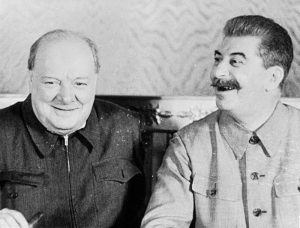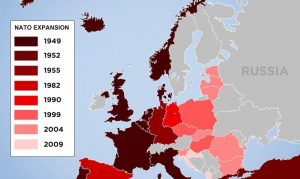Last week NATO held its summit in Warsaw, Poland. As citizens in NATO countries wonder what benefits they get from NATO membership, it is important to consider some facts. Historians and analysts in Western Europe and the United States imbue disproportional blame on Russia while neglecting opportunities for cooperative economic development. Fear of Russia in the United States seems odd considering that Russia was one of the first nations to recognize the United States in 1780, three years before the Great Britain.
Containment of the Russian Empire was a major venture of Great Britain since Napoleon’s failed invasion of Russia in 1812. The U.S. seemed to have forgotten its peaceful relations with Russia through the 19th century as it assumed this British policy by the 1930s with its support of the British “gold blockade” and trade embargo. The imprudent Soviet response at this time was the expansion of Collective Farms at the expense of Kulaks, to increase grain production for the export market. The result was the famine of 1932-33 (for further details please read ‘Who Organised the Famine in the USSR in 1932-1933?‘) In Ukrainian and Western thought, the famine was intentional, the fault of “untrustworthy Russians”.
The Molotov-Ribbentrop Treaty, signed August 23, 1939, is still pointed to as a sign that Russia today cannot be trusted. This Treaty was a non-aggression pact which, if one can put themselves in Russian shoes, was necessary considering the imminent threat they faced from Nazi Germany. Doris L. Bergen in her War & Genocide acknowledges that the Brest-Litovsk (1918) treaty was far harsher on Russia than the Treaty of Versailles was in Germany despite the latter was a loosing side and the former – an “ally, but completely” redefined” by the Bolshevik Revolution and therefore not present at Versailles.

After Hitler escaped from British control in March 1939, the West and Russia needed each other to defeat the Third Reich. By 1942 Stalin’s demands for a Second Front worried Churchill enough to initiate a meeting with Stalin in Moscow that summer. After a formal diplomatic meeting that achieved nothing, the two great leaders met in Stalin’s Moscow apartment for dinner and drinks. Archibald Clark Kerr, the British diplomat in Moscow who later helped put together the Yalta and Potsdam conferences for the “Big Three”, stated in his diary that Churchill was in a ‘triumphant mood’ when he returned to his dacha early in the morning from the personal meeting with Stalin. He also quoted Churchill as having said that Stalin was a ‘great man’ with whom he had ‘cemented a friendship.’
Three years later in Fulton Missouri in May 1946, Winston Churchill had forgotten his diplomacy with Stalin and gave a speech to a crowd of 40,000 in that small town. He talked about the 14th-century alliance between Britain and Portugal and called it a “Temple of Peace.” He mentioned “mutual assistance” and “collaboration.” For ideological reasons, the new Soviet allies were excluded from the temple, and Churchill warned about an “iron curtain” in Eastern Europe. Churchill received the academic honor at this event in Fulton as he alerted the crowd about the Soviet “sphere.” Why didn’t Churchill give a somewhat different speech about victory, unity and the future in Moscow? Did he change his mind about the ‘great man’? He had established a personal contact with Stalin, which if he had cultivated, could have eased tensions. It was easier to go to rural America to draw a large crowd and “woo” Americans into an ideological struggle basing his argument on an obscure 500-year-old treaty between colonial powers.
Let’s not forget that NATO Western Europe and the United States formed in 1949 before the Soviets responded with the formation of the Warsaw Pact. Some people from that generation may say that NATO was a response to the Soviet’s denying Western forces access to Western sectors of Berlin in what is known as the Berlin Blockade in September 1948. This crisis is thought to be the Soviet’s fault because they blocked western allied road, rail and canal access to western sectors of Berlin in an attempt to supply all of the Berlin with Soviet food, fuel, etc. Do we in the West consider that the mistrust might have begun six months earlier when Britain, France, Luxembourg and Belgium signed the Treaty of Brussels without the Soviets? This is considered the precursor to NATO. If the Soviets had been invited and included in this defense treaty or at least consulted, it isn’t difficult to imagine that Stalin’s friend Churchill might have received an invite to Stalin’s 70th birthday party in 1949 for a great evening of drinking and reminiscences of the dark days in 1942. But Stalin was still in power and Churchill had been voted out as Prime Minister and had already given his “iron curtain” speech.
 Clearly today Russia observes and prepares while the U.S. and NATO expand. Russia is in a position to do so since it has a border with NATO bases from the Baltics to Central Asia. Historians still point to the Soviet invasions of Hungary in 1956 and Czechoslovakia in 1968 to as reasons to distrust Russia. It is not apologetic to propose that the Soviets were responding to Warsaw Pact treaty obligations. Hungary and Czechoslovakia were in that pact. Ukraine is not part of NATO. Drang Nach Osten, thrust to the East, is an inevitable reality for a western peninsula like Western Europe. Drang Nach Osten (yearning for the East) loosely translates into Vladivostok (seize the East) in Russian. Russia shares more with Europe than Sir Winston Churchill knew. It is time to stop blaming of Russia. The region could experience greater prosperity and peace if Eastern European countries could find real autonomy. That can only happen if those in the West take a serious look at Russian economic development opportunities on its Eastern borders and understand them as positive developments, not threats.
Clearly today Russia observes and prepares while the U.S. and NATO expand. Russia is in a position to do so since it has a border with NATO bases from the Baltics to Central Asia. Historians still point to the Soviet invasions of Hungary in 1956 and Czechoslovakia in 1968 to as reasons to distrust Russia. It is not apologetic to propose that the Soviets were responding to Warsaw Pact treaty obligations. Hungary and Czechoslovakia were in that pact. Ukraine is not part of NATO. Drang Nach Osten, thrust to the East, is an inevitable reality for a western peninsula like Western Europe. Drang Nach Osten (yearning for the East) loosely translates into Vladivostok (seize the East) in Russian. Russia shares more with Europe than Sir Winston Churchill knew. It is time to stop blaming of Russia. The region could experience greater prosperity and peace if Eastern European countries could find real autonomy. That can only happen if those in the West take a serious look at Russian economic development opportunities on its Eastern borders and understand them as positive developments, not threats.
Rick Moore is the University of Oregon MA graduate (Russian East European and Eurasian Studies program).














Pingback: NATO’s yearning for the East | Protestation
Pingback: NATO’s yearning for the East | GeoPol Intelligence